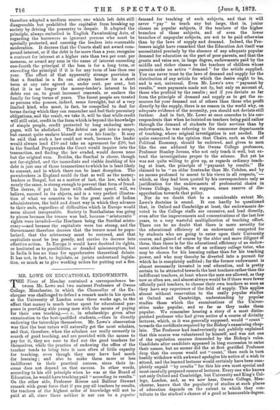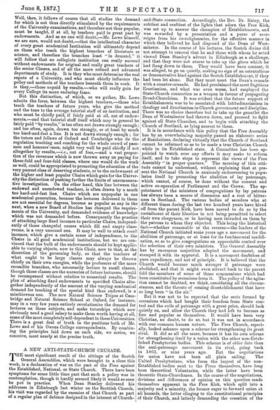MR. LOWE ON EDUCATIONAL ENDOWMENTS.
'THE Times of Monday contained a correspondence be- tween Mr. Lowe and two eminent Professors of Owens -College, Manchester, in which the Chancellor of the Ex- -chequer was challenged to defend a remark made in his speech at the University of London some three weeks ago, to the effect that money is much better spent for educational pur- poses in providing able young men with the means of paying for their own teaching,—i. e., in scholarships given after examination to the best-qualified students, —than in directly endowing the tutorships themselves. Mr. Lowe's observation was that the best tutors will naturally get the most scholars, and that, therefore, when the scholars are really earnestly in search of good teaching, and are provided with the means to pay for it, they are sure to find out the good teachers for themselves, while the practice of endowing the office of the teacher tends to bring into it men often of little capacity for teaching, even though they may have had much for learning ; and also to make them more or less indifferent to their practical success, since their in- come does not depend on that success. In other words, according to his old principle when he was at the Board of Education, he would have teaching paid "according to results." On the other side, Professor Roscoe and Balfour Stewart remark with great force that if you pay all teachers by results, the teachers of the highest order of knowledge will not be paid at all, since there neither is nor can be a popular
studies those which the examinations of the Univer- sities make popular, and so far as they make them popular. We remember hearing a story of a most distin- guished professor who had given notice of a course of divinity lectures, which, as it was generally supposed, would " count ' towards the certificate required by the Bishop's examining chap- lain. The Professor had inadvertently not publicly explained that this course was volunteered by himself, and was not one of the regulation courses demanded by the Bishop's rules. Candidate after candidate appeared in long succession to enter their names, but no sooner did the at first gratified Professor drop that the course would not "count," than each in turn hastily withdrew with awkward apologies his notice of a wish to attend, and the learned lecturer would certainly have been com- pletely unpaid "by results "for this his own most special and most carefully prepared course of lectures. Every one who knows not only Oxford and Cambridge, but University and King's Col- lege, London, and, as we now hear, Owens College, Man- chester, knows that the popularity of studies at such places of education depends on the extent to which they con- tribute to the student's chance of a good or honourable degree. Well, then, it follows of course that all studies the demand for which is not thus directly stimulated by the requirements of the University examinations, and therefore not thus popular, must be taught, if at all, by teachers paid in great part by endowments. And as no one will doubt,—Mr. Lowe himself, we are sure, would not doubt,—that the intellectual character of every great academical Institution will ultimately depend on those who teach the highest branches of literature or science, and therefore the branches least "in demand," it will follow that no collegiate institution can really succeed without endowments for original and really great teachers of the senior Classes, and of all the more refined and advanced departments of study. It is they who must determine the real repute of a University, and who must chiefly influence the policy and methods of the teachers beneath them in rank. It is they,—those unpaid by results,—who will really gain for every College its more enduring fame.
But this distinction, of which, as we gather, Mr. Lowe admits the force, between the highest teachers,—those who teach the teachers of future years, who give the method and the tone to the average tutorial staff of an institution, and who must be chiefly paid, if fairly paid at all, out of endow- ments,—and that tutorial staff itself which may in general be fairly paid "by results," is too often not drawn strongly enough; and too often, again, drawn too strongly, or at least by much too bard-and-fast a line. It is not drawn strongly enough ; for the tutors and fellows of Oxford and Cambridge who do the regulation teaching and coaching for the whole crowd of pass- men and honours'-men, might very well be paid chiefly if not altogether by results,—i.e., out of fees,—and a vast propor- tion of the revenues which is now thrown away on paying for three-fold and four-fold classes, where one would do the work as well, could be appropriated to promoting the education of the very poorest class of deserving students, or to the endowment of the higher and least popular Chairs which gain for the Univer- sity the distinction of pushing farther the limits of unremunera- tive investigation. On the other hand, this line between the endowed and unendowed teachers, is often drawn by a much too hard-and-fast line. Chairs which are unpopular in one academical generation, because the lectures delivered in them are not essential for degrees, become as popular as any in the next, when a new Board of Studies has changed the require- ments of the University, and demanded evidence of knowledge which was not demanded before. Consequently the practice of attaching large fixed incomes to particular Chairs, independ- ently of those changeful causes which fill and empty class- rooms, is a very unsound one. It may be well to attach small incomes, which give a certain sense of independence, to the Chairs in all good academical institutions, but we are con- vinced that the bulk of the endowments should be kept applic- able to varying objects, now to this Chair, now to that, at the discretion of the governing body, so that the teachers of what ought to be large classes may always be thrown chiefly on their own energies, while the professors of the more recondite branches, who necessarily lecture to small classes, though those classes are the nurseries of future lecturers, should be recompensed without relation to numerical results. The plan of attaching fixed endowments to specified Chairs alto- gether independently of the amount of the varying academical demand for teaching of the special kind thus endowed, is a mischievous one. The new Natural Science Tripos at Cam- bridge and Natural Science School at Oxford, for instance, may in a very few years entirely revolutionize the demand for
lectures on these subjects, and make tutorships which now obviously need a good salary to make them worth having at all, some of the most completely self-dependent in these Universities. There is a great deal of truth in the positions both of Mr. Lowe and of his Owens College correspondents. By combin- ing the principles laid down on each side, we arrive, we conceive, most nearly at the precise troth.



































 Previous page
Previous page